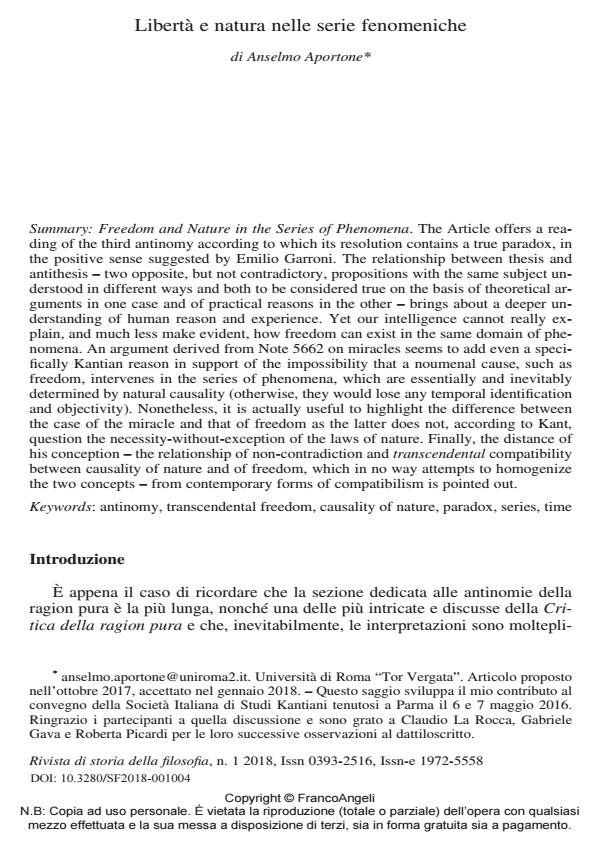Libertà e natura nelle serie fenomeniche
Journal title RIVISTA DI STORIA DELLA FILOSOFIA
Author/s Anselmo Aportone
Publishing Year 2018 Issue 2018/1
Language Italian Pages 40 P. 79-118 File size 211 KB
DOI 10.3280/SF2018-001004
DOI is like a bar code for intellectual property: to have more infomation
click here
Below, you can see the article first page
If you want to buy this article in PDF format, you can do it, following the instructions to buy download credits

FrancoAngeli is member of Publishers International Linking Association, Inc (PILA), a not-for-profit association which run the CrossRef service enabling links to and from online scholarly content.
Freedom and Nature in the Series of Phenomena. The Article offers a reading of the third antinomy according to which its resolution contains a true paradox, in the positive sense suggested by Emilio Garroni. The relationship between thesis and antithesis - two opposite, but not contradictory, propositions with the same subject understood in different ways and both to be considered true on the basis of theoretical arguments in one case and of practical reasons in the other - brings about a deeper understanding of human reason and experience. Yet our intelligence cannot really explain, and much less make evident, how freedom can exist in the same domain of phenomena. An argument derived from Note 5662 on miracles seems to add even a specifically Kantian reason in support of the impossibility that a noumenal cause, such as freedom, intervenes in the series of phenomena, which are essentially and inevitably determined by natural causality (otherwise, they would lose any temporal identification and objectivity). Nonetheless, it is actually useful to highlight the difference between the case of the miracle and that of freedom as the latter does not, according to Kant, question the necessity-without-exception of the laws of nature. Finally, the distance of his conception - the relationship of non-contradiction and transcendental compatibility between causality of nature and of freedom, which in no way attempts to homogenize the two concepts - from contemporary forms of compatibilism is pointed out.
Keywords: Antinomy, transcendental freedom, causality of nature, paradox, series, time
Anselmo Aportone, Libertà e natura nelle serie fenomeniche in "RIVISTA DI STORIA DELLA FILOSOFIA" 1/2018, pp 79-118, DOI: 10.3280/SF2018-001004